[This is the text version of my video, “An Introduction to Prophecy in History”.]
I’ve got something to tell you about that’s had a tremendously good effect on my life: prophecy. 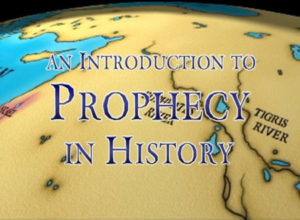 It’s a big subject. Just the word prophecy brings different thoughts to people. So I’ll narrow it down a bit. But first, I’ll tell you about myself so you’ll understand my interest in this subject.
It’s a big subject. Just the word prophecy brings different thoughts to people. So I’ll narrow it down a bit. But first, I’ll tell you about myself so you’ll understand my interest in this subject.
I grew up in Texas and was in university before I had any knowledge of spiritual things. By then I was an atheist, active in turning anyone who had faith in God away from that faith. But through experiences, I just could no longer believe that there was not a spiritual world. I didn’t want to be “religious”. But I’d experienced a world of both good and evil spirits. And I wanted to be with the good ones.
My search took me to different groups and I eventually met some young people who were radical Christians, “Jesus freaks” they were called. They helped me understand the truths in the Bible. God gave me a new start in life and I eventually dedicated my life to Him. I’ve now lived over 36 years abroad and it’s been a wonderful life I’m very thankful for.
So when I say “prophecy”, I’m speaking of the prophecies in the Bible. And that is the subject of this series of classes. We are going to look at the prophet Daniel. In fact when Jesus was asked about the future, He mentioned specifically the prophet Daniel. He said, “When you shall see… (the future events) …spoken of by Daniel the prophet (whoever reads, let him understand)…” (Matthew 24:15)
I imagine some of you know a lot about this and are itching to dive into the details. Others of you know basically nothing about this. And if I had to choose between those two groups, I’m going to aim this at those of you who are new to this subject. That’s how I was till I was almost grown. And that’s perhaps one of the reasons why I want you to know the thrills and joys of the truths within the book of God, the Bible, and the truth in that book.
Some of you may be wondering, “What in the world is prophecy?” And you think, “Oh yeah, sure sure; someday the world will end, blah, blah, blah.” That’s the way I used to think about this and it all sounded pretty stupid and bizarre to me.
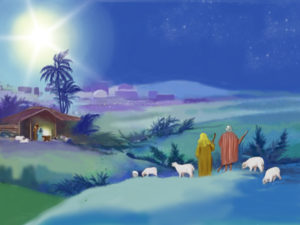 Well, let’s see if there is something almost everyone already knows about which was clearly prophesied centuries before it happened. It’s safe to say that everyone reading this knows about Christmas. And you know at Christmas people often sing Christmas carols. It’s the celebration of the birth of Jesus and you’ve seen the pictures of Joseph and Mary and the baby Jesus with them.
Well, let’s see if there is something almost everyone already knows about which was clearly prophesied centuries before it happened. It’s safe to say that everyone reading this knows about Christmas. And you know at Christmas people often sing Christmas carols. It’s the celebration of the birth of Jesus and you’ve seen the pictures of Joseph and Mary and the baby Jesus with them.
And you’ve probably heard the old Christmas carol, I can’t really sing it but goes something like, “Oh little town of Bethlehem, how still we see thee lie…”. 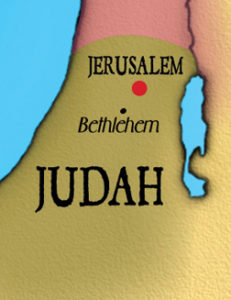 This Christmas carol is about the town very near Jerusalem where Jesus was born. Maybe you already knew that He was born there or at least you remember you heard that somewhere before.
This Christmas carol is about the town very near Jerusalem where Jesus was born. Maybe you already knew that He was born there or at least you remember you heard that somewhere before.
This is something you know at least a little about. So, let’s look at the Bible. Let’s look in the Old Testament in the book of the prophet Micah. This was from around 700 B.C.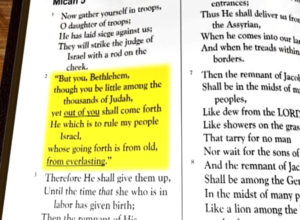 We’re going to look at chapter 5, verse 2. In it, it’s like the voice of God is speaking to the town or village of Bethlehem. It says, “But you, Bethlehem, though you be little among the thousands of Judah, yet out of you shall come forth He which is to rule my people Israel, whose going forth is from old, from everlasting.”
We’re going to look at chapter 5, verse 2. In it, it’s like the voice of God is speaking to the town or village of Bethlehem. It says, “But you, Bethlehem, though you be little among the thousands of Judah, yet out of you shall come forth He which is to rule my people Israel, whose going forth is from old, from everlasting.”
Here God is speaking to Bethlehem and saying that, although Bethlehem is a small town among the many in the region of Judah (a province of Israel at that time), yet out of Bethlehem would come the One who would ultimately rule God’s people. And that this one was from old, from everlasting.
That’s a direct prophecy from the Old Testament, given hundreds of years before the birth of Jesus, declaring specifically where the Messiah, the King whom God would send, would be born. And actually there are a lot more prophecies like that.
When this was new to me, it took me a while to begin to realize that there was a power in heaven, the Power of the God of the Bible, that has been telling the future of the world for thousands of years. And that these foretellings, these prophecies have been coming to pass with absolute accuracy. This was astonishing to me. In some ways it still is. This is what we are going to study about: prophecy that has been fulfilled and also prophecy that is yet to be fulfilled.
But, when I mentioned about the birth of Jesus at Bethlehem, I wanted to find something almost everyone was familiar with. And then when we saw from the Bible that, 100’s of years before His birth, there had been given a prophecy about Jesus being born in Bethlehem, you could appreciate and understand the significance of it. So, next we are going to look briefly at the backdrop of human history and set the stage so to speak, in order to see the imprint of prophecy that’s foretold so much of what came to pass afterwards.
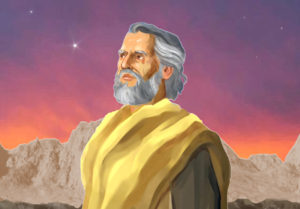 God chose a man around 4000 years ago (2000 BC). He came from the part of the world that we today call Iraq. His name was Abraham. From the descendants of Abraham come the people that we know of today as the Jews. For that matter, the Arab peoples and the Muslim faith also draw their roots back to Abraham.
God chose a man around 4000 years ago (2000 BC). He came from the part of the world that we today call Iraq. His name was Abraham. From the descendants of Abraham come the people that we know of today as the Jews. For that matter, the Arab peoples and the Muslim faith also draw their roots back to Abraham.
But the Old Testament is the book of the Jews. So to understand prophecy, we’ll need to have a bird’s eye view of the history of the Jews. At the same, time we’ll need to see the rise and fall of the ancient empires up to the time of Jesus and the Roman Empire.
 Here are some of the key characters of the Bible and their points in history. Abraham is placed at approximately 2000 BC and Jesus at 30 AD. Between these dates we have Moses around 1400 BC, King David around 980 BC and the prophet Daniel, whose writings we are preparing to study, around 600 BC
Here are some of the key characters of the Bible and their points in history. Abraham is placed at approximately 2000 BC and Jesus at 30 AD. Between these dates we have Moses around 1400 BC, King David around 980 BC and the prophet Daniel, whose writings we are preparing to study, around 600 BC
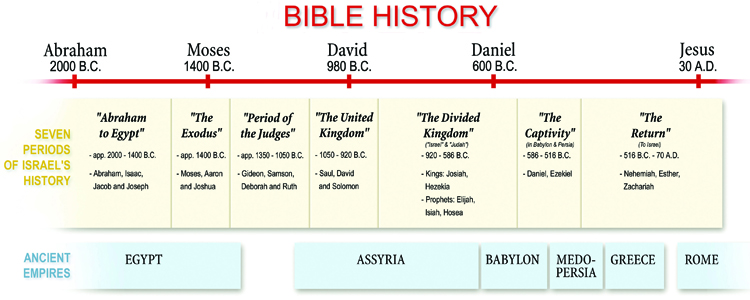 Someone put this together and I found it a very convenient way to remember and place the major phases of the history of Israel. It’s called “The Seven Periods of Israel’s History”. To start with you have “Abraham to Egypt”.
Someone put this together and I found it a very convenient way to remember and place the major phases of the history of Israel. It’s called “The Seven Periods of Israel’s History”. To start with you have “Abraham to Egypt”.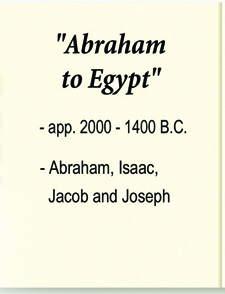
God spoke individually to the man Abraham and told him to leave his country and journey towards a new land that God said He would give him. Abraham traveled up the Euphrates River and then down into the land of Canaan, the area we today call Palestine or Israel.
All the while God was promising Abraham that He would eventually make of him a mighty nation. Perhaps Abraham’s greatest quality was his faith in God. For example, it was difficult for Abraham to believe God on this thing He was telling him because by this time both Abraham and his wife were up into their 70’s, 80’s and 90’s and they had no children. So how could Abraham be able to be the father of a mighty nation? But Abraham “kept on believing”, just as God knew he would. And eventually Abraham’s wife, Sara, did have a son, Isaac.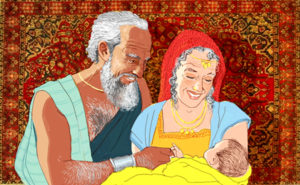 And as time passed on, Isaac married and his wife, Rebecca, had twins: Esau and Jacob.
And as time passed on, Isaac married and his wife, Rebecca, had twins: Esau and Jacob.
I’m just giving you the highlights here; there are oodles of interesting parts I’m leaving out. This is all in the first book of the Bible, the book of Genesis. And what we’re talking about now took place nearly four thousand years ago in Palestine or as it was called then, Canaan.
Jacob eventually married; actually he had two wives, 12 sons and one daughter. One of his sons was named Joseph.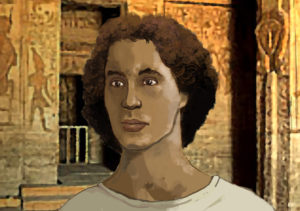 As it turned out, Joseph ended up being his dad’s favorite. Also God Himself seemed to be indicating that Joseph was going to be special among his brothers. Well, as so often happens, his brothers got mad and jealous of him
As it turned out, Joseph ended up being his dad’s favorite. Also God Himself seemed to be indicating that Joseph was going to be special among his brothers. Well, as so often happens, his brothers got mad and jealous of him  and they ended up selling Joseph as a slave to some people who were traveling off to Egypt at the time.
and they ended up selling Joseph as a slave to some people who were traveling off to Egypt at the time.
But in the long run this was all the hand of God. Joseph ended up becoming “second in Egypt” the Bible says, next to the Pharaoh. Many years later, his brothers who had sold him came to Egypt to buy food because of a great famine. It’s an incredible story. But Joseph recognized his brothers and made it possible for them and their aging father Jacob and all their families to move from Canaan to Egypt where they could be under the protection of Joseph.
Many years later, his brothers who had sold him came to Egypt to buy food because of a great famine. It’s an incredible story. But Joseph recognized his brothers and made it possible for them and their aging father Jacob and all their families to move from Canaan to Egypt where they could be under the protection of Joseph.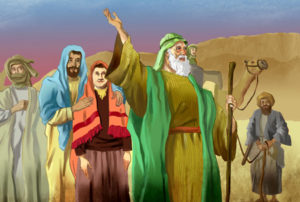 And they stayed there and grew over the next 400 hundred years until they became…a mighty nation, just like God had told Abraham they would.
And they stayed there and grew over the next 400 hundred years until they became…a mighty nation, just like God had told Abraham they would.
The next period of Israel’s history is maybe one you might be more familiar with. Have you ever heard of “The Ten commandments”? This period is called “The Exodus”. That’s also the name of the second book of the Bible. It takes place around 1400 BC and the main characters were Moses, Aaron who was Moses’ brother, and Joshua, who was the man God chose to lead the Jews after Moses passed on.
It takes place around 1400 BC and the main characters were Moses, Aaron who was Moses’ brother, and Joshua, who was the man God chose to lead the Jews after Moses passed on.
Moses himself was a little similar to Joseph in that he was Jewish but had ended up in a very high position in Egypt. However God spoke very directly to Moses that He wanted him to lead the Jews back out of Egypt. They were to return to the land of Canaan where their forefathers had been.
Led by Moses and the very presence of God, the Jews miraculously crossed the Red Sea,  journeyed through the Sinai desert and eventually re-entered and conquered the land of Canaan. During this time,
journeyed through the Sinai desert and eventually re-entered and conquered the land of Canaan. During this time, 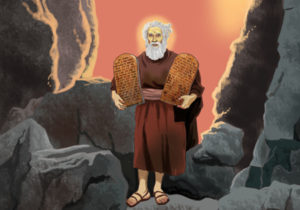 God gave the 10 Commandments to Moses and the laws that the nation of Israel was to be ruled by.
God gave the 10 Commandments to Moses and the laws that the nation of Israel was to be ruled by.
I could tell you about a prophecy all the way back, 100’s of years before this time, where God was already telling the ones then that this was going to happen. Four centuries before the Exodus, God spoke to Abraham in a dream. From Genesis chapter 15: 13 & 16, “Then He said to Abram: ‘Know certainly that your descendants will be strangers in a land that is not theirs. [And that’s what happened to them in Egypt.] And will serve them. [They eventually became slaves in Egypt.]. And they will afflict them four hundred years. [That’s how long it turned out they were there.] But in the fourth generation they shall return here.”
And this is exactly what was happening with the Exodus of the Jews from Egypt and their return to Canaan. After their return and conquest of Canaan, the Jews lived with a form of government that can be called a theocracy for around the next 300 years. That is, they were to be ruled by God. They didn’t have a parliament or even a king. But they were ruled by the laws and commandments God had given Moses. And the tribe of priests called the Levites were entrusted to see to it that these things were carried out.
 This time can be called “The Period of the Judges” because every so often God would raise up key people to lead Israel during times of crisis. Some of those listed here were Gideon, Samson and Deborah. The unity of the country was primarily a spiritual unity and the people lived in the various regions of Canaan or Israel, according to the tribe they were from.
This time can be called “The Period of the Judges” because every so often God would raise up key people to lead Israel during times of crisis. Some of those listed here were Gideon, Samson and Deborah. The unity of the country was primarily a spiritual unity and the people lived in the various regions of Canaan or Israel, according to the tribe they were from.
Around 1050 BC some major things began to change in Israel. God had raised up a very wise and devout high priest, Samuel. 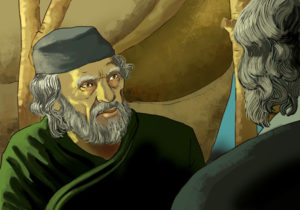 But the people of Israel, wanting to be like other nations, called upon Samuel to choose for them a king, like other nations had. God had in the past cautioned against this but the people insisted that Samuel give them a king.
But the people of Israel, wanting to be like other nations, called upon Samuel to choose for them a king, like other nations had. God had in the past cautioned against this but the people insisted that Samuel give them a king.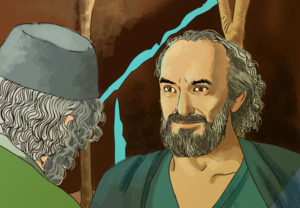 The result was that God led Samuel to choose out a man named Saul to be their king.
The result was that God led Samuel to choose out a man named Saul to be their king.
At the first Saul was truly a man of God and was used to gather together and strengthen Israel against some of their enemies. All Israel united under this king Saul and for a while things went well. This period that we are talking about now can be called “the United Kingdom”. During this time Israel went from be a loose-knit confederation of tribes under the priestial tribe of Levi to being a genuine nation. Eventually they were even a major regional power in the Middle East.
During this time Israel went from be a loose-knit confederation of tribes under the priestial tribe of Levi to being a genuine nation. Eventually they were even a major regional power in the Middle East.
But ultimately the life of Saul is one of the saddest stories in the Bible. As he became more successful and honored in Israel, he less and less followed the instructions he was given from God through the prophet Samuel. Because of this God told Samuel that he should anoint a new king. This turned out to be Israel’s best loved and most remembered monarch, King David. 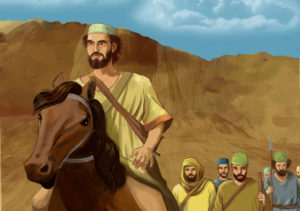 Samuel was told that that “the Lord had found him a man after his own heart”. (I Sam. 13:14).
Samuel was told that that “the Lord had found him a man after his own heart”. (I Sam. 13:14).
And this was certainly an appropriate description of King David. Under king David Israel reached its zenith as David fulfilled the role of king, prophet and in his prayers even somewhat a priest. At war or at prayer or in repentance for his sins, David lead by example and was called by his people in his lifetime, “the light of Israel”. Again here we can go back to ancient prophecy and see if fulfilled at this time. We can go back almost 1000 years before the time of David to Abraham again, when he was just an old man with an old wife and no children at all.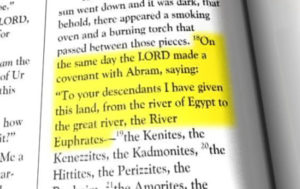 From Genesis 15, verse 18, “On the same day the LORD made a covenant with Abram, saying, ‘To your descendants I have given this land, from the river of Egypt to the great river, the River Euphrates.’”
From Genesis 15, verse 18, “On the same day the LORD made a covenant with Abram, saying, ‘To your descendants I have given this land, from the river of Egypt to the great river, the River Euphrates.’”
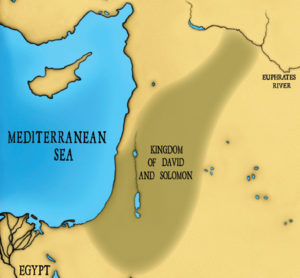 Under the rule and conquering kingdom of David and Solomon after him, the borders of Israel stretched from the border of Egypt all the way up to the Euphrates River, just as God had told Abraham it would happen nearly 1000 years before.
Under the rule and conquering kingdom of David and Solomon after him, the borders of Israel stretched from the border of Egypt all the way up to the Euphrates River, just as God had told Abraham it would happen nearly 1000 years before.
David’s son Solomon was the third and last king of this period of the United Kingdom. God had given him his request from the beginning of his reign. 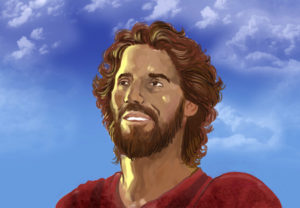 Solomon asked God for wisdom to rule God’s people. And that wisdom is still spoken of and studied in the book of Proverbs in the Bible to this day.
Solomon asked God for wisdom to rule God’s people. And that wisdom is still spoken of and studied in the book of Proverbs in the Bible to this day.
Unfortunately, the influence of one dynamic and Godly leader, like King David, seems seldom to reach beyond the second generation of his followers. This is what happened and it culminated in the division of the Jewish nation. Solomon’s son, whose name was Rehoboam, was supposed to rule after his father. But he didn’t have the heart of his grandfather David or the wisdom of his father Solomon. A rebellion sprung up among the formerly united tribes and the result was that the kingdom and nation of Israel divided.
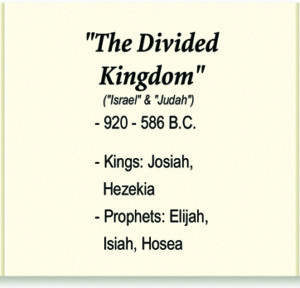 This began the period of “The Divided Kingdom”. The 10 northern tribes were led initially by a rebel against the dynasty of David and they set up a capital in the north. These 10 northern tribes came to be called at that time “Israel”. Only the tribe that David’s family came from, Judah, along with Saul’s tribe, Benjamin, stayed together in the south of the country. These people came to be called simply “Judah”.
This began the period of “The Divided Kingdom”. The 10 northern tribes were led initially by a rebel against the dynasty of David and they set up a capital in the north. These 10 northern tribes came to be called at that time “Israel”. Only the tribe that David’s family came from, Judah, along with Saul’s tribe, Benjamin, stayed together in the south of the country. These people came to be called simply “Judah”.
 So around 920 BC., after over 100 years as a united nation, the Jewish people became two countries. In the next two hundred years, the northern part, “Israel”, generally went from bad to worse. Have you ever heard of “Jezebel”? Even today that is a term meaning a woman without shame. She was the foreign wife of one of the kings of Israel at that time. God sent prophets to warn the people of their apostasy and coming judgment if they didn’t come back to God, prophets like Elijah and Hosea. But they were largely ignored.
So around 920 BC., after over 100 years as a united nation, the Jewish people became two countries. In the next two hundred years, the northern part, “Israel”, generally went from bad to worse. Have you ever heard of “Jezebel”? Even today that is a term meaning a woman without shame. She was the foreign wife of one of the kings of Israel at that time. God sent prophets to warn the people of their apostasy and coming judgment if they didn’t come back to God, prophets like Elijah and Hosea. But they were largely ignored.
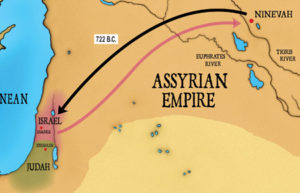 In 722 BC the unthinkable happened. God allowed the foreign power of the Assyrians to conquer northern Israel and carry away most of the people as slaves and captives far away to the east. The nation that God had brought into being and called His own was decimated and, as their prophet Hosea had told them would happen, they became “wanderers among the nations.” (Hosea 9.17)
In 722 BC the unthinkable happened. God allowed the foreign power of the Assyrians to conquer northern Israel and carry away most of the people as slaves and captives far away to the east. The nation that God had brought into being and called His own was decimated and, as their prophet Hosea had told them would happen, they became “wanderers among the nations.” (Hosea 9.17)
But the southern two tribes, “Judah”, stood firm. The reason was simply that the people and their kings, more often than not, stayed closer to the Lord. They were less idolatrous and more humble and believing than northern Israel and therefore God could and did protect them and keep them longer. Both the north and the south had their better and worse of times and leaders. But Judah, in times of national crisis, took heed to the prophets God sent, such as Isaiah. Or at least they did sometimes. Eventually though, Judah also fell away from her faith in and love for God so that God finally told them that they’d become more evil and idolatrous than the pagan nations surrounding them.
We come now to the generation of Daniel, approximately 600 BC. Judah was in the last years before her fall and destruction. God had raised up the prophet Jeremiah,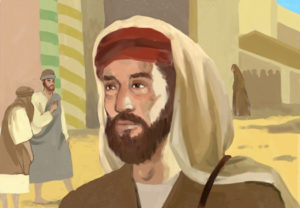 one of Israel’s greatest prophets, to have the thankless job of being His mouthpiece during the last years of the nation’s existence. Jeremiah told them that the new world power, Babylon, which had recently defeated the Assyrians, would come up against Jerusalem. God was going to allow Babylon to act as His judgment on His own people.
one of Israel’s greatest prophets, to have the thankless job of being His mouthpiece during the last years of the nation’s existence. Jeremiah told them that the new world power, Babylon, which had recently defeated the Assyrians, would come up against Jerusalem. God was going to allow Babylon to act as His judgment on His own people.
And this is what happened. 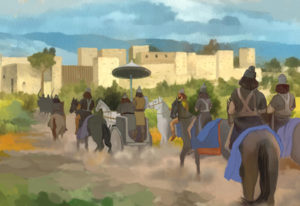 Around the year 604 BC, the king of Babylon sent an expeditionary party against Judah and Jerusalem and brought them partly under his rule. By 586 BC, in response to their resistance, Nebuchadnezzar of Babylon had totally defeated and destroyed the kingdom of Judah as well as their capital, Jerusalem.
Around the year 604 BC, the king of Babylon sent an expeditionary party against Judah and Jerusalem and brought them partly under his rule. By 586 BC, in response to their resistance, Nebuchadnezzar of Babylon had totally defeated and destroyed the kingdom of Judah as well as their capital, Jerusalem.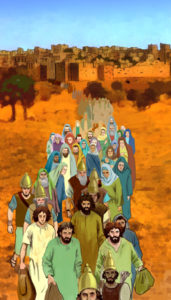 Most of the survivors were carried away to be captives and slaves in Babylon. Only a very small remnant of the Jews was left in their homeland. This then began the next period of Israel’s history, “The Captivity”.
Most of the survivors were carried away to be captives and slaves in Babylon. Only a very small remnant of the Jews was left in their homeland. This then began the next period of Israel’s history, “The Captivity”.
 Had God abandoned His people? Far from it. During this most difficult of times, when the Jews were receiving the judgment they had been warned of for decades and centuries, a cluster of the mightiest prophets ever were used by God to speak his Word to the Jews at that time. Jeremiah, Daniel and Ezekiel, although a generation apart, lived during this time. They taught and spoke to Israel, and to surrounding nations as well, to explain what was happening and to exhibit God’s continuing presence.
Had God abandoned His people? Far from it. During this most difficult of times, when the Jews were receiving the judgment they had been warned of for decades and centuries, a cluster of the mightiest prophets ever were used by God to speak his Word to the Jews at that time. Jeremiah, Daniel and Ezekiel, although a generation apart, lived during this time. They taught and spoke to Israel, and to surrounding nations as well, to explain what was happening and to exhibit God’s continuing presence.
And through this time of intense uncertainty, God continued to give clear prophecy for the hope and future of His people. One example of this is found in the writings of Jeremiah. Twice God spoke clearly to Jeremiah that there would be a specific, limited amount of time for this captivity of the Jews. From Jeremiah chapter 29, verse 10, we can read: “For thus says the LORD: After seventy years are completed at Babylon, I will visit you and perform My good word toward you, and cause you to return to this place.”
It was to be for 70 years. And did that happen? Was it a 70-year captivity? Yes, it was. According to the Bible and secular history, the beginning of the end of the captivity took place between 536 and 516 BC, marking 70 years from the beginning of Babylon’s occupation of Israel around 606 BC, as well as its final destruction in 586 BC.
We continue to see the eternal hand of prophecy, God keeping His Word to us down through the centuries. Are there more things like this in the Bible? Is there anything like that yet to be fulfilled in our day or in days to come in our times? 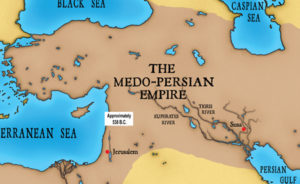 This will be our focus more and more as these classes continue.
This will be our focus more and more as these classes continue.
During the 70 year period of the Jews’ captivity, the empire of Babylon was defeated by a coalition of two nations, the Medes and the Persians. This dual kingdom became the predominant power in the ancient world for the next 200 years.
 The final period of Israel’s history is called “The Return”. It was King Cyrus of Persia who first granted permission for the Jews to begin to return from exile in Persia to their former country and to inhabit Jerusalem.
The final period of Israel’s history is called “The Return”. It was King Cyrus of Persia who first granted permission for the Jews to begin to return from exile in Persia to their former country and to inhabit Jerusalem.
Humbled and repentant, the Israelites who did decide to return to their land made a renewed effort to keep the laws and faith that had been entrusted to their forefathers so many centuries before. In time Jerusalem was rebuilt and a temple was erected, 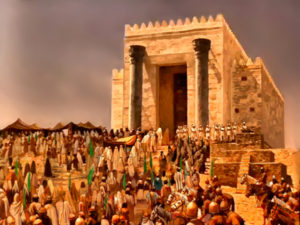 although it was nowhere near as glorious as the original one built by Solomon.
although it was nowhere near as glorious as the original one built by Solomon.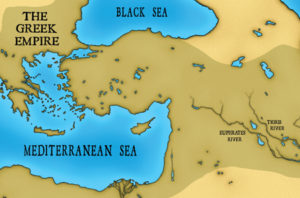 God preserved the Jewish nation and they survived the coming of the Empire of Alexander the Great and the era of Grecian world rule in the centuries that followed, up to the time of Rome.
God preserved the Jewish nation and they survived the coming of the Empire of Alexander the Great and the era of Grecian world rule in the centuries that followed, up to the time of Rome.
The society of Israel evolved and changed much through the influences that Greece brought during their realm. 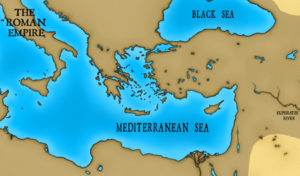 And yet there were those in Israel that led them back to the faith that they had originally been entrusted with, the calling to be separated from other nations and to worship only the Lord their God.
And yet there were those in Israel that led them back to the faith that they had originally been entrusted with, the calling to be separated from other nations and to worship only the Lord their God.
In time Rome replaced the Greeks as the dominant secular power in the world of that day.  And it was in the first century of Roman rule in the Middle East that we come up to the time of the birth of Jesus in the city of Bethlehem.
And it was in the first century of Roman rule in the Middle East that we come up to the time of the birth of Jesus in the city of Bethlehem.
In this first class we’ve learned at least a bit about what is prophecy. We’ve taken a bird’s eye view of the history of the people and nation of Israel. And we’ve looked a just a few of the many incredible prophecies that are throughout the Old Testament.
The future that those prophecies pointed to back then is now for us, for the most part at least, the past. But we may yet find things to be fulfilled. The certainty of prophecy may yet have words to speak for our times or those soon to come. In our next study we’re going to drop down into the period of time just as southern Israel, or Judah, is about to be overrun by Babylon. This is around 600 BC.
 We’re going to study events in the life of Daniel who was a young Jewish exile in Babylon. At that time perhaps he was no more than 14 years old. The second chapter of Daniel will be our introduction and next step along the path of prophecy. We’ll learn how God will picture for us the ancient empires that would come to pass in the next centuries after Daniel’s time. And we’ll learn that God spoke clearly as well that eventually, in His time, He Himself would bring a government and rule of His own to our very earth. Some call it the Millennium. Hard to believe? I hope you’ll be back for the next class to see this all for yourself. God bless you!
We’re going to study events in the life of Daniel who was a young Jewish exile in Babylon. At that time perhaps he was no more than 14 years old. The second chapter of Daniel will be our introduction and next step along the path of prophecy. We’ll learn how God will picture for us the ancient empires that would come to pass in the next centuries after Daniel’s time. And we’ll learn that God spoke clearly as well that eventually, in His time, He Himself would bring a government and rule of His own to our very earth. Some call it the Millennium. Hard to believe? I hope you’ll be back for the next class to see this all for yourself. God bless you!
I really enjoyed reading this on my iPad. Although I view myself as a mature Christian..there is always more to learn as we read our Bibles.
Thank you for this, especially the prophecy.
Linda Williams